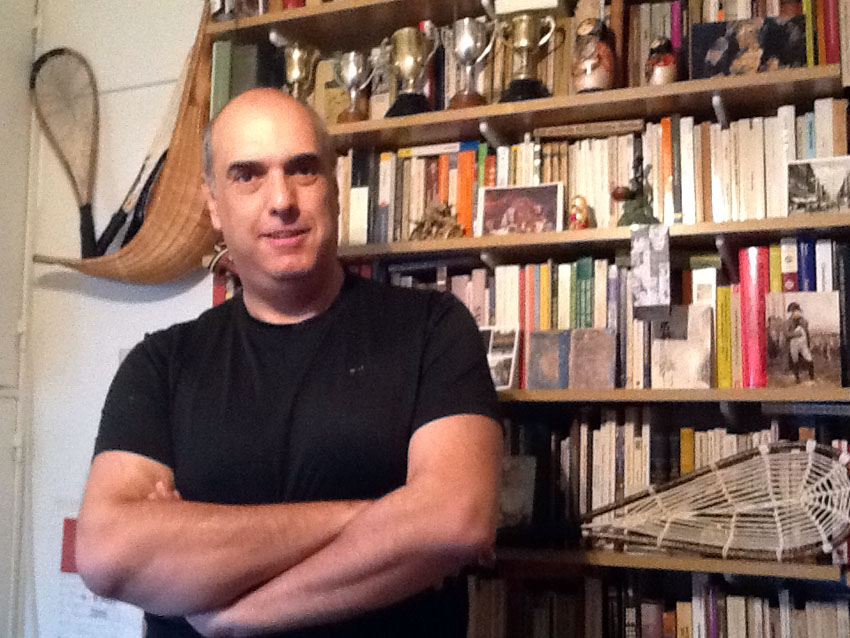Joseba Etxarri. His everyday job is located at the CONICET, Argentine National Council of Scientific and Technical Research, where he runs a department of medieval studies and also teaches classes at the University of Buenos Aires. He has also studied and worked in countries like Germany, France and the US, to finally return, nearly a ten year ago, back to his native Buenos Aires, where has settled and seems comfortable in the various facets and activities he is involved in.
-You just got back from the World Basque Pelota Championships in Mexico because besides your academic resume you have also added National Xare Coach.
-I am committed to the revitalization of pelota one of the particularities of the Basque heritage in Argentina. It is interesting to see how some types of pelota, practice of which is limited to some areas of the Basque Country, like Xare or Trinquete, came to Argentina at the end of the 19th century and became very popular and widespread games, until they were eventually replaced by “paleta Argentina” that was also invented by a Basque from Baigorri, Gabriel Martiren.
-You are the author of the book Xare, the Argentine Racquet, a Story of Basque Pelota in Rio de la Plata, that is now in print.
-I talk about the pelota as a cultural heritage that becomes anonymous for Argentinean people, until loosing its Basque trace. It is impressive to see photos taken in 1900, for example in Montevideo that show 50 pelotaris playing Xare. This is until the 30s, when Argentine Paleta, played in a Trinquete, but with a rubber ball and not a leather one, ends up prevailing.
-How did Argentina do at Worlds?
-I’m satisfied with how we did in Xare, because after several years we were able to make it to the podium again. We lost the semifinal against Cuba and we beat Spain…But I know that we still have a lot to do.
-What is your personal Basque connection?
-I met my two grandmothers and they were Basque. One came from Laudio and Barakaldo and the other was from Lower Navarre, from Garazi. I traveled to Europe with my parents when I was eleven and I got to know the country and I liked the place I came from. Later, I began to study Basque at Laurak Bat in Buenos Aires, with Pedro Aranoa, and in the 90s I participated in the Eusketxe, the Basque Cultural Center, with Niko Iguain Azurza. Basically, we tried to bring Basque to the people who were close to a Basque club. We wanted to awaken the ethnic memory of many people, and I think it worked.
-What’s it like to live in Buenos Aires?
-Beautiful. I’m not only talking about existential terms, but also professionally. I too am Byzantinist, I work and publish in Greek and Aramaic and I have work, and I feel very comfortable in it. I have worked in various European countries and the US and I can say that his is one of the most interesting cities that I have known. It is dynamic and cosmopolitan. Here you can go to the theater seven days a week; we have three opera seasons…
-Do many foreigners come with the crisis?
-The city maintains its tradition and culture of open arms. There is work here. The majority of waiters are from Colombia and from other South American countries. The society that welcomed our grandparents still exists. We all grew up hearing our friends’ grandparents speaking whatever language. This is an open and dynamic society, and continues to be and this is vitally very nutritious.
-In this time when budget cuts for research are the order of the day, it is comforting to see people like you who continue to work normally.
-Argentina has a very effective program for the repatriation of scientists. For example, in the department that I run, since I become involved we have doubled our numbers. And let me tell you, in relation to the presence of Basque in academia in Argentina, we are working on an initiative that the Etxepare Institute is also involved in, to offer Argentine scholarship winners, the possibility to research professionally on Basque themes, sponsored by the Argentine government. Leaving the Basque communities to work on more cultural things, this effort hopes encourage Ph.Ds. in Argentina to opt for research along Basque lines, as part of the humanities or social sciences. If it works, there will be a new way to insert Basque into the Argentine landscape as well as in Argentine institutions.






 Send to a friend
Send to a friend Add comment
Add comment








